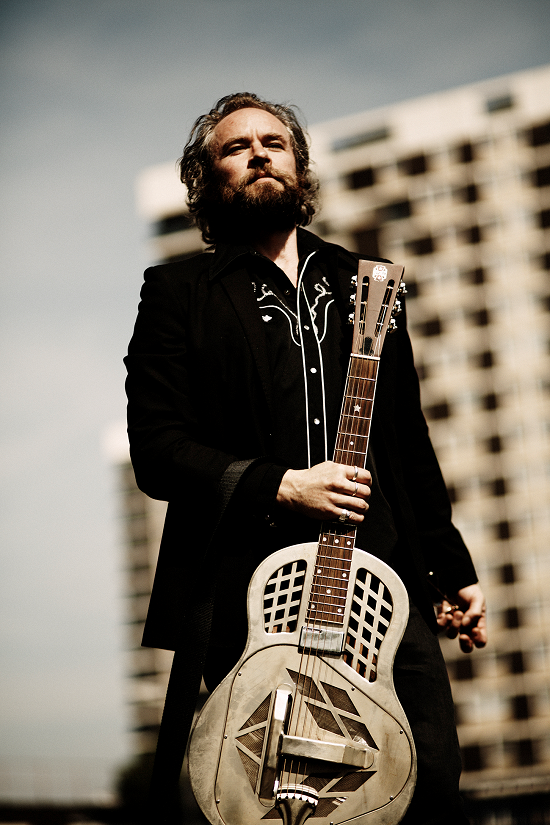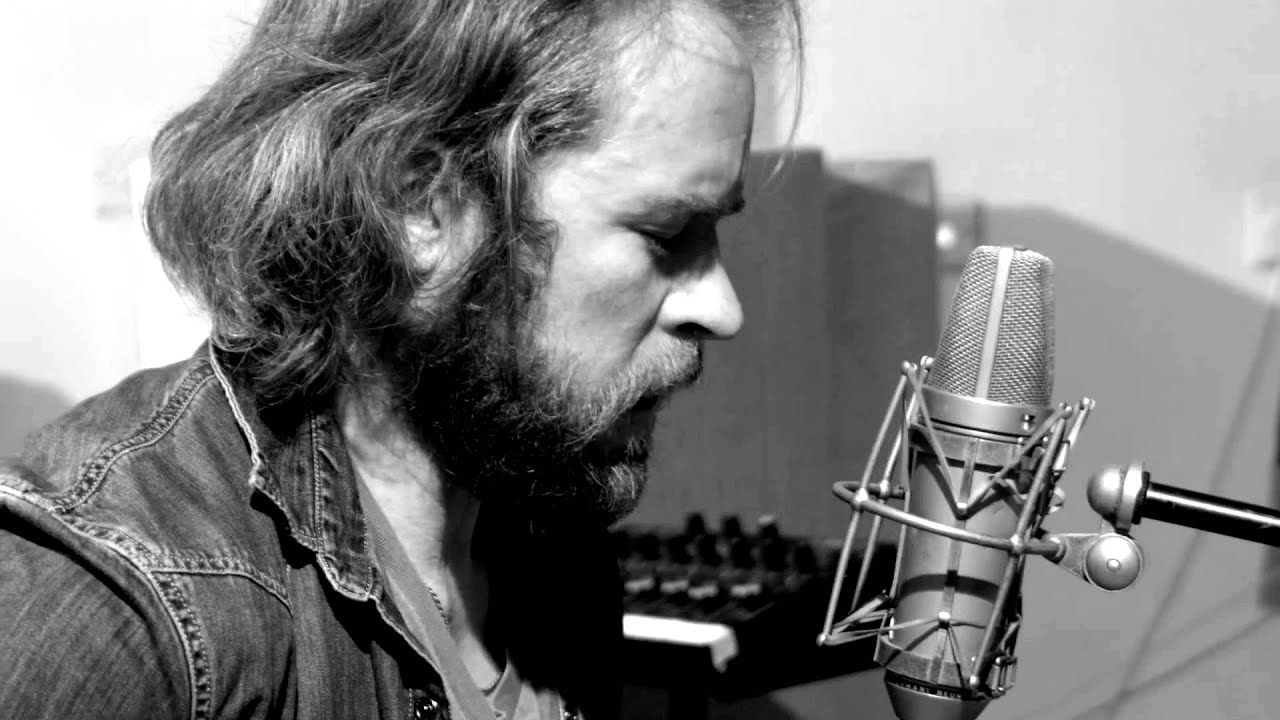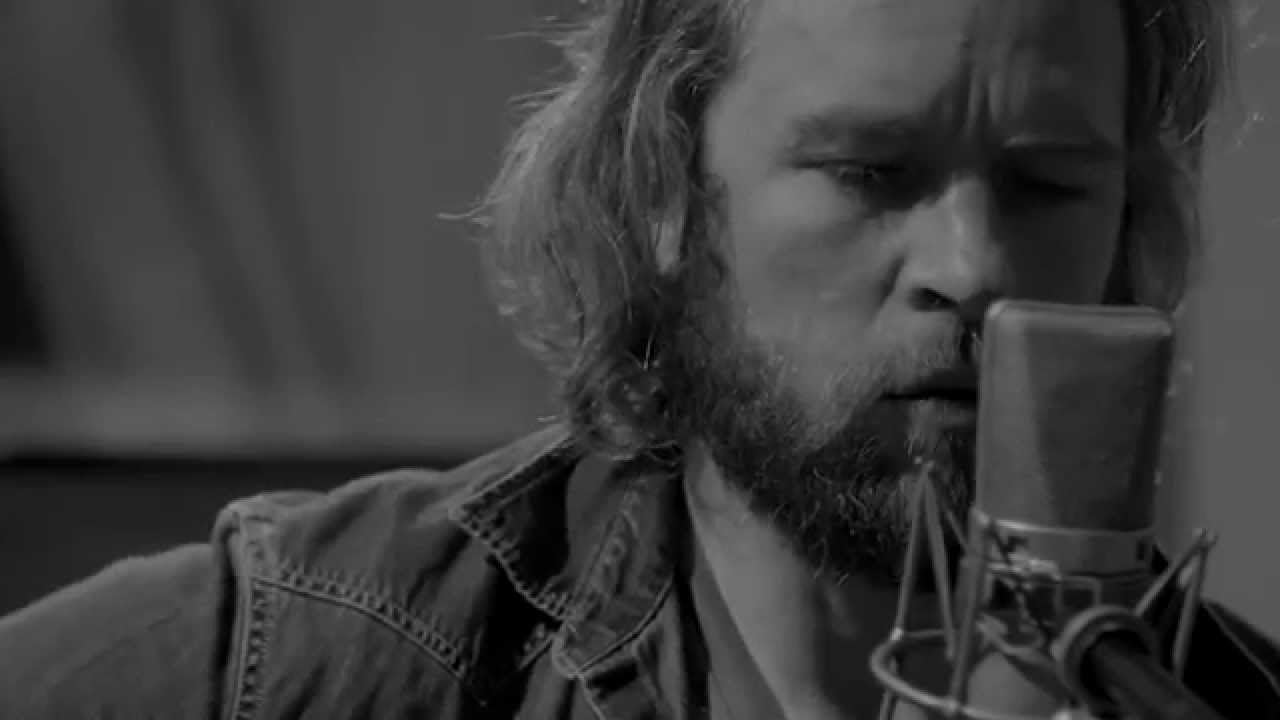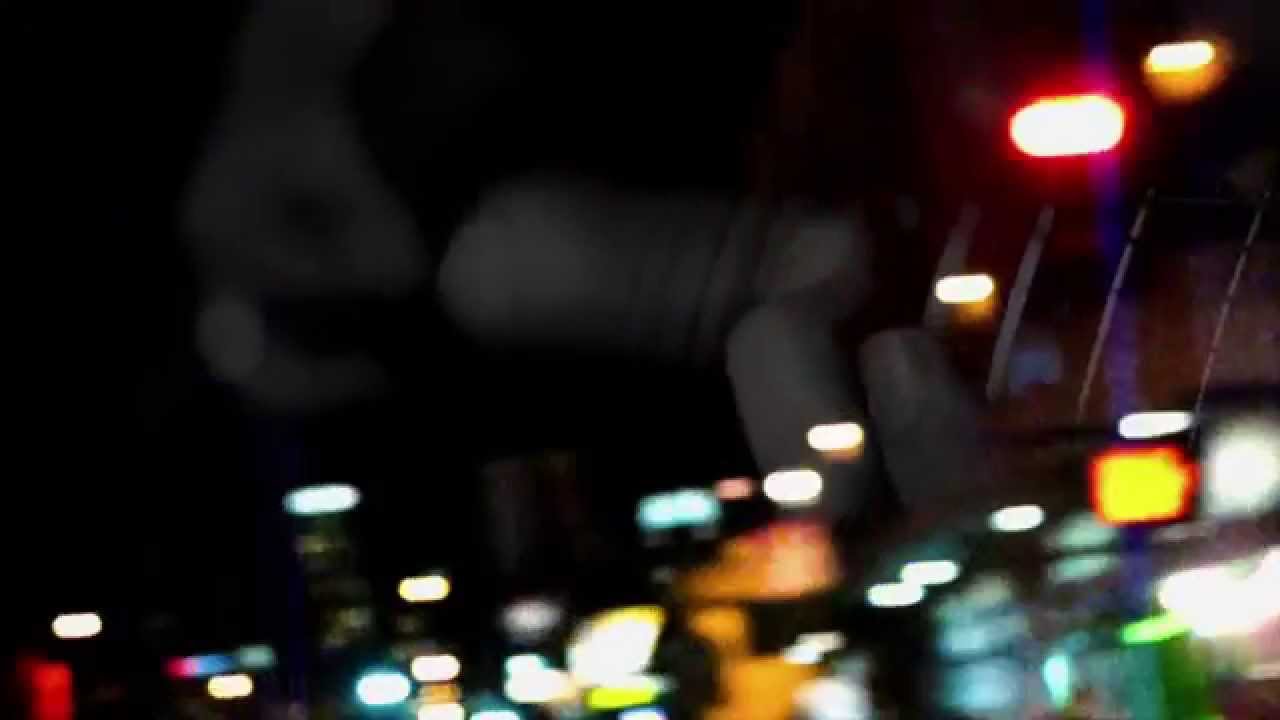Portrait by Steve Gullick
Along with his four solo albums, Duke Garwood is well-known and loved for his collaborations. He’s provided rhaita for the Archie Bronson Outfit and clarinet for Savages, played with the Master Musicians Of Jajouka and become something of a soulmate to Soulsaver Mark Lanegan. After Garwood played guitar on Lanegan’s 2012 album Blues Funeral, they became friends and released an album together, last year’s Black Pudding. It’s a record redolent of the desert and as sharp as a cactus needle. They’ve recently been discussing a second collaboration, which Garwood told me has the working title Hot Lunch.
Garwood also wrote ‘I Am The Wolf’ for last year’s Mark Lanegan Band album, Phantom Radio. "I should have kept that for myself," he smiles. But Lanegan loved the song and it was hard to refuse him, especially as Garwood believed it could become a standard in his good friend’s live canon. Besides, Garwood has plenty more great tunes in his arsenal, as his new solo album, mixed by Lanegan and Queens Of The Stone Age cohort Alain Johannes, attests.
The cover image of Heavy Love is a close-up of Garwood’s face, so it was easy to recognise him when I met him outside the British Museum as dusk fell one January afternoon. I’d arrived early and been inside to see an exhibition, Witches & Wicked Bodies, and when I saw Garwood there seemed to be a mystic aura suspended in the cold air around him. Garwood’s otherworldliness permeates his songs, but there is a definite sense of place, too. Lie down and let his music envelop you – you’ll be transported to the time and place it was recorded.
You play all sorts of instruments – what did you play on Heavy Love?
Duke Garwood: A lot of guitars, some drums, no horns this time. A little harmonica, believe it or not. Lots of shakers. I played some bass but not all of it. The real beautiful bass on there is a guy called Brett Lyon – he’s a beautiful artist I’ve known for a while. Pete Marsh plays bass on it, too, and Alain Johannes plays some keyboards. Most of the work from me is just guitar. The first track is all me – guitars, drums, shakers and stuff – but I think the album’s got a special sound because I don’t play everything. I used to do that, play all the horns, the keys, everything. If one artist plays everything on one record you can kind of hear it. It’s almost groovy, quite liquid, but maybe it doesn’t surprise that person because it’s themselves on top of themselves on top of themselves…
Did you lay it all off as separate tracks or did you perform as a band?
DG: There’s a track called ‘Disco Lights’ and one called ‘Suppertime In Hell’ that were played with drums at the same time. The others are all me, but often the guitar and voice are together but it’s an international record because it’s been recorded all over the place.
That’s interesting, because your music seems to be about place, or at least the listener feels a sense of place.
DG: You do? Oh good.
Where did you grow up?
DG: In very rural Kent, a tiny place about three miles from Edenbridge, in the sticks. I very much came from a rural place, but I longed for the big city.
And you live in Hastings now?
DG: I just moved there recently.
Were you playing guitar from a young age?
DG: I was given a guitar when I was two years old, so I’d notch it to then. I wasn’t taught anything though and I never really learned anything specific until I was 17. I could play it but I didn’t know what to do on it. I preferred the piano.
Didn’t you do an early record somewhere in Surrey, in a barn?
DG: That was the second album, Emerald Palace. It was recorded in a holiday cabin and it had to be acoustic. We weren’t allowed any electric stuff and it was this beautiful place – Box Hill, I think it was called. It was glorious midsummer, it was really hot and sunny, and you really can hear that on the record. The walls were thin. It was intense but it was all open and we just felt good. Sometimes you can hear a recording with a good energy and that was one of them.
How was it working in Josh Homme’s Pink Duck studio in LA?
DG: That was after Black Pudding was finished. We had two extra days. Queens Of The Stone Age were moving all their rig out to the desert to rehearse for their next record so they could practise as a full band. I hit it really hard. I went there in the morning, Justin Smith was kind enough to hang out and record everything. I did a lot of tunes that day – ‘Hawaiian Death Song’, ‘Roses’, ‘Sweet Wine’ and the vocals for ‘Snake Man’ all ended up on the album. There were about four other tunes but I threw them out – me and Mark [Lanegan] are ruthless. If we have a tune that’s kind of alright, but it’s not coming up, we don’t keep it. You have to destroy it. You press delete and wipe it from the computer and from your memory. It means you never fall back on something you once considered to be substandard. It doesn’t matter if anyone else says they really like it.
That’s a refreshing approach.
DG: There’s so much music out there, I don’t want to put anything out that I have any doubts about. I have to make sure the energy is right from the beginning. It has to start from a good place. I haven’t always been like that – I have about six or seven albums’ worth of material at home to prove it. Maybe I’ll be like, ‘Oh that sounds amazing’ when I’m 80 or 90, but I doubt it. I’ll want to keep going.
You get approached to work on a lot of other people’s projects – how do you decide whether to be involved?
DG: If it’s theirs and they want me to play, say, the horn then I just deliver as best I can for the tune. Nobody ever wants me to play guitar on anything, but I don’t take it personally! If I didn’t like the music then I’d react as I must, but so far I’ve been lucky and I’ve not been in that situation.
How does it feel swapping between gun for hire and main man?
DG: It’s fine – I always feel it blends in. It’s all part of me.
You’re a country boy from Kent, now you’re recording in the desert – is that reflected in your work?
DG: I feel the expanse. I was walking along earlier today actually and I heard someone say, ‘The guitar is the music of the soul.’ I didn’t even see this guy, I just saw his back, but it really is. If you’re playing the way you want to play, and if you get it right, it will reflect something in yourself. People say they hear the desert in my music, they feel the desert. One guy said he felt like he was on his Harley driving through Texas or something. Maybe it’s the tranquility. The idea of nothingness – no buildings, no claustrophobia, no strange energy, it’s just like wind. You almost feel like you could expand in yourself. That’s maybe what I’m expressing.
It feels like there’s a spiritual connection between Black Pudding and Heavy Love. If you recorded a record in the UK would it be different?
DG: A lot of the tunes I did record here – they weren’t all recorded over there. I did feel a nice connection making music in LA but I wrote all of Black Pudding in England. Except for ‘Shade Of The Sun’ – Mark wrote that. I couldn’t write a song like that. Mark writes uniquely, very simply.
Other than that one, did you record all the music on Black Pudding first and then Mark added his words?
DG: I demo-ed every tune several times in order for Mark to get a feeling. I knew I had to get them down. Once I got there it was like, ‘Where do you want to start?’ Then when I recorded those numbers it was me alone. That was hard generating right from the ground up, in a new studio that’s very fresh and bright. I had to really hit it.
Was that the most expensive studio you’d worked in at that point?
DG: Yeah, definitely. I took about two weeks to put all the stuff down and Mark did his stuff all in a day, leaving the last couple of days just to add his vocals on. It was cool.
There’s a full three minutes of you on that record before Mark starts singing…
DG: That was Mark’s idea. He was actually going to whistle on that tune, but he changed his mind.
‘Cold Molly’ from Black Puddingis really funky, but on Heavy Love there aren’t as many poppy moments. It feels like a heavier record.
DG: I think it’s accessible as far as my output goes. You can listen to it and relax, you don’t have to try to listen to it. That’s the difference.
Why is that?
DG: I’ve mellowed out maybe? Those songs came from a certain place. And also because I rooted out everything that didn’t fit into the theme.
Do you go in with a narrative in mind, or is it just a collection of songs?
DG: Well, it all started with that first track ‘Sometimes’. My mate Dan Beban was staying with me, from my old band Little Wet Horse – which was one of those bands that was too great for the music business. We made four records we put out ourselves, we were a bit like the Master Musicians Of Jajouka – just three geezers who smoked too much grass. So Dan and I went out for the day, and I said I’m going to start recording. I bought this cheap microphone and I recorded that tune in one day. I was like, ‘There the album begins, that’s the benchmark tune. If they can’t be there or above that, they’re not in the record.’ And then four years later…
That’s how long it takes?
DG: It can, yes, it really can. I think Black Pudding is the lesson, it’s such a great album. I hear too many albums that aren’t albums to me. I was very particular about something holding me all the way through – that was vital. My friend Josh T Pearson took 10 years to put out a new record. We talked about it. There’s just no point knocking something out there in today’s world. It disappears in the fizz, gets involved in all that white noise and is gone again. It’s going to do that anyway, I know that, but it has to be right. If you’re going put your boat out on the ocean, make sure there are no holes in it.
Mark Lanegan mixed Heavy Love, right?
DG: All my mix was done. I’d spent ridiculous amounts of money mixing it and it just wasn’t happening. I played it to Mark and he said, ‘Sorry dude, it sounds like shit. I don’t even know why you’re playing it to me.’ I was like, ‘Sorry, what can I say?’ He said, ‘Give it to me and Al and we’ll mix it.’
He honestly said it sounded like shit?
DG: In so many words. It’s the same tunes though.
What did they push with their mix?
DG: I don’t know what they did, but Alain’s a magician. He lent me all the instruments to play on Black Pudding. He’s a beautiful man. I don’t know what he does but they mixed all the tunes and he added his special dust to it – he took it to the Hollywood lights and he made it sound like it does. They pushed my vocal massively in a way I wouldn’t because I’m a coward. Then he has great reverbs and gave it that sound it has – it just drifts over your ears. I record raw, I don’t add anything, to give it the maximum tone. If you give something like that to someone who knows what they’re doing, they can make something of it. Mark and Al had a great time doing it. We’re pals but I think the music was good for them. They said it was like medicine or therapy.
Alain Johannes writes poetry too, I believe.
DG: Yeah he does, although I haven’t read any. He writes songs all the time. He’s got an album out now, it’s great. Alain can play everything really well, with great love. He plays a mini cigar-box guitar with six strings…
Does he bring toys out for you?
DG: He gave me a tenor sax, a bass clarinet, a few guitars, a tricone. He was really generous.
I love your lyrics, particularly ‘We catch fire in the pouring rain’ from ‘Sometimes’. It’s pretty soulful.
DG: Thanks. Yeah, I’m either soulful or I’m really angry.
What makes you angry?
DG: The world at the moment is really driving me nuts.
I’ve been reading your Twitter feed and I could see it was a mixture of great lost musicians and anger…
DG: So many musicians.
Jack Bruce.
DG: A terrible loss. God, yeah.
And anger at the food banks.
DG: I’m just finding it so frustrating. My friends have their arms in the air, saying, ‘Oh my God, Ukip’s gonna destroy us!’ But Farage is a buffoon. Mosley was way more dangerous than him and he ended up in jail as a traitor. Don’t worry about these pricks. Farage – are you scared of that loser? There’s a bit of a defeatist attitude going around at the moment: ‘Oh no we’re all doomed.’ No, they’re doomed in Syria where they’re running for their lives but we’re not doomed. Have another cappuccino.
Another cappuccino in Tin Pan Alley, once it’s been knocked down and turned into flats…
DG: It’s bullshit man, they’re fucking up London. Someone’s going to look back and say, ‘What did you do?’ They’re going to change it like they changed New York, remove anything that can’t pay the rent. It’s a real shame and I feel sorry for bands. What’s a young band gonna do? Where’s their first central London gig going to be?
It’s going to be out east.
DG: I suppose it will all go east, but even then… My friends have a great bar in Dalston and they were doing fine, but now Dalston’s no longer ‘hip’, and it’s leaving a wasteland behind. It’s like a strimmer in the park – they’re cutting everything back and there’s nowhere left for the wildlife.
They’re killing off all the arts in school too, and that’s something the UK is good at – the arts and ideas.
DG: We are creative, and to be creative you need some breathing space and you need to not worry all the time that your creativity won’t provide you with money. How’s a band gonna start? Are they going to start doing that beautiful thing where you play music with other people for the first time, but with a view to making money from it at some point, because otherwise it’s a waste of time? For fuck’s sake. Play for five years and then worry about making some money from it.
America really has to think that way. You can’t get a doctor or a dentist. You can’t break your leg. I was on tour with a guitar tech in America who broke his ankle playing frisbee – it was pretty silly. We did a gig, and I was like, ‘Surely you have to go to hospital?’ and he said, ‘No man, I’ve got no insurance.’ I just thought, What the fuck? He borrowed a cast from another guy and then a crutch, all the while hobbling around working with no medical attention. Finally he was so terrible he had to be fired. And he couldn’t get his ankle fixed because he didn’t have insurance, because he couldn’t afford it.
Do you still feel British?
DG: Yeah, I’m a man of this island sure. I used to hate being from here in a way, but I don’t anymore. I just thought everywhere else was nice.
Do you make mistakes?
DG: Say you hear John Lee Hooker, he’s not fucking around at all. It seems like the music comes straight out of him. There’s no diversion. He’s not thinking about playing, he’s not thinking about singing, he’s not trying too hard. It’s flowing out of his soul. That’s what I want to achieve.
Basically you remove the idea of a bad gig. There is no bad gig. There cannot be one. It’s not even a question. You might make mistakes or mess up a tune but it’s not going to make a bad gig, because it’s all flowing naturally. And if it’s not then you’re trying to make music that’s not right for you, and that’s something that will be glaringly hideous in your life. Thinking about playing too hard, trying to be a bit too inspired, trying to do music that isn’t natural for you… It’s not a plaything. People treat it like a toy, they just try out different toys. That’s fine. It doesn’t work for me though.
Essentially if you took all my shit and mashed it altogether it’d be one tune, one thing I could play for 10 years straight. Like The Master Musicians Of Jajouka. That’s what they do. They’re a bunch of old guys, they smoke a lot, they drink too much coffee and sugary drinks and when they’re happily filled up they just start playing. And when they start playing it’s as if they’d been playing the whole time. They don’t say, ‘We’re gonna start playing now,’ and put their playing hats on. It was as if they’d never been sitting there drinking coffee in the first place. It’s like you take these human bodies, just bumbling around eating and shitting, and there’s this part of them that plays music and that transforms these old men into gods. That’s what I’m after.
Can you tell me about playing live with them?
DG: It was the greatest gig of my life. I’d read about them for so long that I wanted to go and play with them. But you can’t just go and play with them. Shezad Dawood, this great artist, built a massive dream machine, like the one Brion Gysin created. It was just an awesome project and he wanted them to play and me to play with them because he needed to bring a cracker western honky to go into the wilds and be a guy who doesn’t know.
Did you get on well with them?
DG: Immediately. I hung with Bachir [Attar]. We smoked cigarettes all night – the Arab Spring was happening in Egypt right then and we stayed up all night. He taught me some riffs that were very old and I knew we’d be alright because they knew my desires were the same as theirs. The music they’re making is like a healing music, almost – it’s completely uplifting. They make life with the music. They play for babies being born, they play for sick people. That’s what they were hired for, historically, in the village. Weddings. Funerals. Births. Deaths. They’ll play at your deathbed if you wish, to heal your sickness. The air smells of perfume when they play. Literally. You can smell physical perfume. When they’re a master they take on the name Attar, and that means ‘perfume maker’. When you become a master, which can take 20 years or more, that’s what you get.
How many masters are there?
DG: Quite a few – 12 when I was playing with them.
Did they see a kindred spirit in you?
DG: They were super cool with me. It wouldn’t be right for everybody. Or maybe it would be – maybe they’re so magic that they’ll make a proper player out of anyone. That’s what I was looking for. I love showbusiness – doing shows, and the crowds, and all that amazing atmosphere. It’s beautiful music because it’s sonic, it’s powerful. I want to be able to use it right, positively.
Your face is right on the cover of the album.
DG: My big face. The first time I’ve had my face on a record.
Why now?
DG: I won’t do it again, but it had to be Heavy Love if if I was ever going to. Just bold and beautiful and with my big ugly face on the cover. If you have the vinyl it’s really big, a full-sized face. Bigger than my face. Quite exciting.
Jehnny Beth from Savages is on the album, and you played on the Savages album. What is it about her that you like?
DG: Well, I’ve known her a long time. She and Johnny Hostile [also of John & Jehn], I’ve known them a long time. When I first recorded Heavy Love, it was just me. I’d done it alone, just voice and drums – very simple. I played it to them and Jehn loved it. I think it brought a tear to her eye. Hostile said, ‘Can I have the stems to play around with?’ and he did an amazing mix which will be available at some point. Then there was this other track and her voice was on there and his voice is in the beginning of the track and it sounded beautiful. It was something they wanted to do themselves.
I’ve listened a lot to Heavy Love in the daytime and it feels odd – it feels more like a nighttime record.
DG: I think most of my stuff is nighttime music. It’s mostly recorded in the day but I write in the nighttime, except for the song ‘Heavy Love’.
It feels like you’ve got to lie down before you listen to it.
DG: Well, you know, it’s Heavy Love, isn’t it? It’s great on headphones, there’s a lot in there. A musician who’s a very classy geezer he heard it and told me, ‘It’s just what I needed, cheers buddy.’ That made me glad.
Like you said, it’s medicating…
DG: That’s the idea, that’s what I’m looking for. You can’t just throw music out there and hope to be worshipped. There is too much expectation for things like that from musicians. Nobody needs to be worshipped any more. The world’s so fucked up, you’ve got to give it something heavy.
Heavy Love is out 9 February on Heavenly. Duke Garwood is appearing at several in stores in February and is on tour in the UK during April





